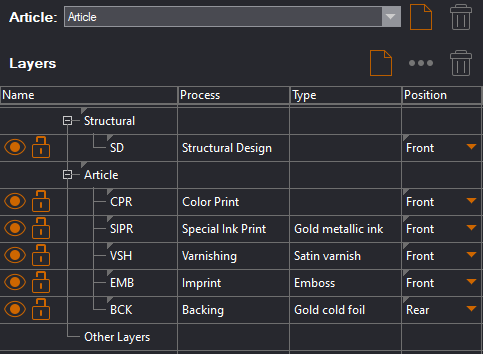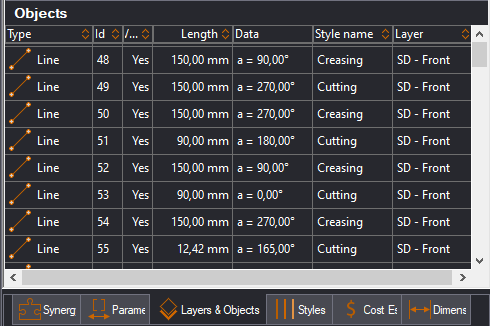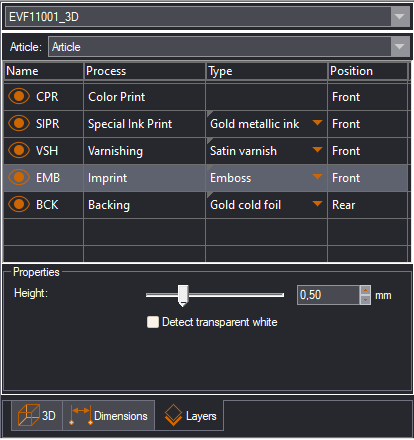



You create, edit and delete layers in the 1up drawing. To see how objects placed in layers looks, go to the structure's 3D model. To see how applied effects look on a structure, go to its 3D model view.
You create, edit and delete process layers in the Layers & Objects tab in the tabular area of the 2D environment.
The layers section lists the available process layers, their type and position.

| Property | Icon | What It Means |
|---|---|---|
| Visibility |  |
The objects in this layer are visible in the graphical area. |
 |
The objects in this layer are not visible in the graphical area. | |
| Editability |  |
You can delete the objects in this layer or edit their properties. |
 |
You can neither delete the objects in this layer nor edit their properties. |
| Article | If multiple articles are created for a part, here you choose which of them to visualize. |
|---|---|
| Name | The name of the layer: SD (structural), BRL (Braile), CPR (color print), EMB (Imprint), SIPR (special ink printing), LMN (lamination), VSH (varnishing), PFS (partial foil stamping), MRP (monochrome print), DB (dieboard), SH (sheet), AUX (auxiliary) |
| Process | The actual process. You can create processes in any order you
like. Regardless of the order of creation, EngView
lists them as follows:
|
| Type | Indicates the concrete process. This property is editable in the 3D drawing and helps you quickly choose another type of the same process. For example, if a gloss lamination effect has been created in the 1up drawing, in the 3D area you can switch it with Matt Lamination without the need to return to the 1up drawing. |
| Position | Indicates whether the process applies to the front or the rear side of the material. This property is editable only in the 1up drawing. |
Lists the objects in the layer selected in the Layers section. If no layer is selected, all the objects in the design are listed.

| Type | Shows what the objects is: a Synergy component, image, text, line, circle, and so on. |
|---|---|
| Id | Auto-generated identifier for the object |
| Visible | Indicates whether the object is visible in the graphical area. The options are Yes and No. |
| Length | Displays the size of the object. NOTE: The information is context-dependent — for example, no quantifiable data appears for Synergy components, text and images. |
| Data | Displays the content of the object. NOTE: The information is context-dependent — for example, no data appears for Synergy components, text or images. |
| Style name | Shows the style of the object. Default* applies only to components, as they can include objects in various styles. |
| Layer | Shows the layer to which the object is assigned. The * symbol applies only to components, as their objects can be assigned to various layers. |
Тhe 3D environment is where you view the set processes as they will lie onto the packaging model's surfaces. Use the

| Property | Icon | What It Means |
|---|---|---|
| Visibility |  |
The objects in this layer are visible in the graphical area. |
 |
The objects in this layer are not visible in the graphical area. | |
| Editability |  |
You can delete the objects in this layer or edit their properties. |
 |
You can neither delete the objects in this layer nor edit their properties. |
| Dropdown List | In 3D representations with multiple 3D parts, lists the parts. The table displays only the process layers for the selected part. |
|---|---|
| Article | If multiple articles are created for a concrete part, here you choose which of them to visualize. |
| Name | The name of the process: BRL (Braile), CPR (color print), EMB (Imprint), SIPR (special ink printing), LMN (lamination), VSH (varnishing), PFS (partial foil stamping), MRP (monochrome print) |
| Process | The name of the process. EngView
lists any set processes as they were set in the 2D environment,
in the following order:
|
| Type | Indicates the type of the process layer. This property is editable only in the 3D drawing and helps you quickly choose another effect of the same type. For example, if a gloss lamination effect has been created in the 1up drawing, in the 3D area you can switch it with Matt Lamination without the need to return to the 1up drawing. |
| Position | Indicates whether the process applies to the front or the rear side of the material. This property is editable only in the 1up drawing. |